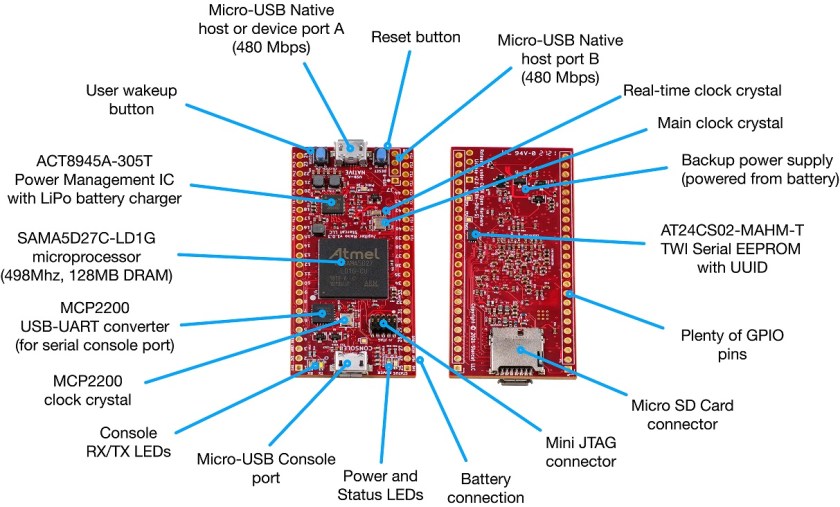Jupiter Nano is an open source, tiny, high performance embedded hardware that runs NuttX RTOS or embedded Linux.
It has a tiny 48-pin (two side edge connector) form factor (1.125″ x 2.5″, similar in size to the Teensy 4.1) and is 10x more powerful than the Arduino Due.
The board is from Starcat LCC, a Seattle, USA based company who previously had a successful crowduspply coampaign for HackEEG shield for Arduino Due

For Arduino Users
Jupiter Nano will be good board for existing Arduino users who want to move to a tiny but powerful computer with more CPU power, lots of RAM, or has real time operating system (NuttX).
For Embedded Linux Users
It should also be attractive to embedded Linux users as well who are looking for a tiny, open-source hardware computer with lots of I/O and high-speed Wi-Fi.
The applications for a board this small, and this powerful, are nearly endless.


Features & Specifications
- Size: Tiny 48-pin form factor (1.125″ x 2.5″, similar in size to Teensy 4.1)
- Operating System: Supports Embedded Linux & NuttX RTOS, or MicroPython (on Linux)
- CPU: Microchip SAMA5D27C-LD1G (ARM Cortex A5 Core) running at 498 Mhz
- DRAM: AP Memory AD2100XXX 128 M x 32 LPDDR2 DRAM chip integrated into system-in-package (SIP)
- Power management: Qorvo ACT8945A with integrated LiPo battery charging capability
- 10x more powerful than the Arduino Due:
- ARM Cortex A5 processor running at 498 Mhz (7x clock speed of the Arduino Due)
- 128 MB RAM (1280x RAM of Arduino Due)
- Key peripherals use DMA (USB, SPI, I2C, Flexcom)
- I/O:
- USB 2.0 HS port on USB-micro B jack (Port A, 480 Mbps, host or device)
- USB 2.0 HS port on a pin-header connection (Port B, 480 Mbps, host only)
- USB 2.0 FS Debug console port on USB-micro B jack (12 Mbps)
- MicroSD Card slot, OS boots from the sd card.
- Dedicated SPI and I2C ports
- 4 FLEXCOMs on I/O pins – flexible serial controller peripherals that can be used for interfacing SPI, UART, or I2C devices.
- 40 IOs are available out of 48 pins available on the both side edge connectors.
- Programming: a dedicated JTAG port for programming and debugging is provided
- Status LED to show Processors activity and Power LED for power is provided. Additionally Two LEDs for RX TX are there for USB console Port. One more LED is given for PMIC to show the state.
- Reset Button and User button is provided.
Jupiter Nano is part of the Microchip Get Launched design program, using Microchip’s SAMA5D27C-LD1G CPU and a MCP2200 – USB-UART converter!
Jupiter Nano is Open Source
Hardware is designed in KiCAD and is available Open Source.
Where to Buy Jupiter Nano Board?
It is available on crowd supply now, you can get one for 79$.